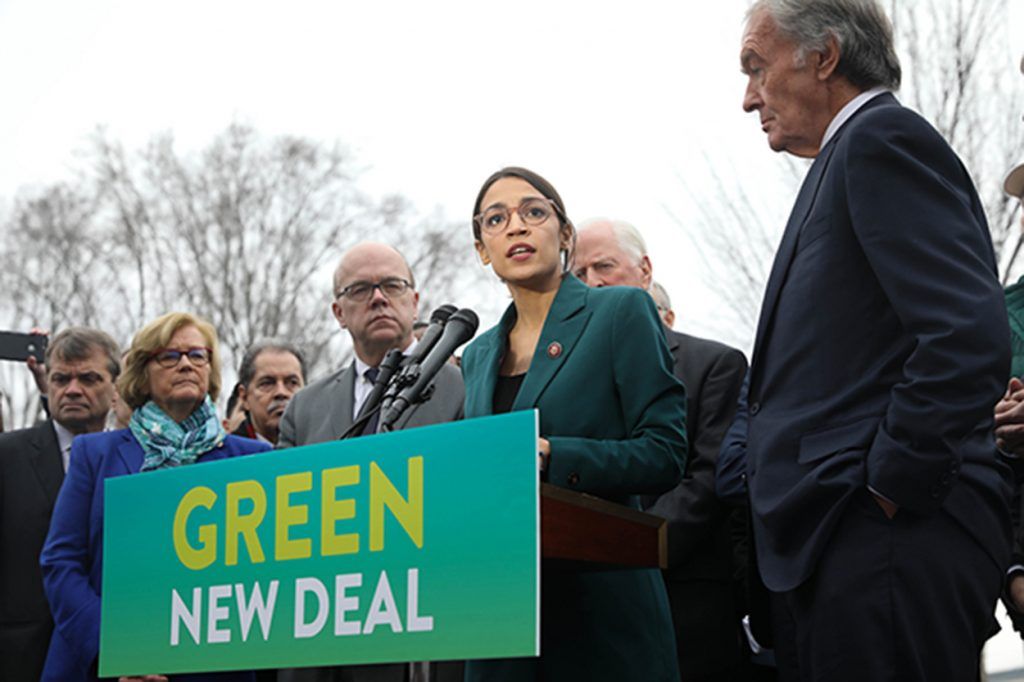Protecting oil companies instead of the climate-vulnerable is elitist
By Dana Nuccitelli | March 28, 2019
 Co-sponsors of the Green New Deal, Rep. Alexandria Ocasio-Cortez, D-NY (behind podium) and Sen. Ed Markey (D-MA), far right. Image courtesy Senate Democrats, under Creative Commons License.
Co-sponsors of the Green New Deal, Rep. Alexandria Ocasio-Cortez, D-NY (behind podium) and Sen. Ed Markey (D-MA), far right. Image courtesy Senate Democrats, under Creative Commons License.
At a recent House congressional hearing on legislation aimed at addressing homelessness, Rep. Sean Duffy, a Wisconsin Republican, introduced an amendment aimed at demonstrating how addressing climate change could increase the cost of housing. In the hearing Duffy said, “We talk about how we care about the poor, but all the while we’ll sign bills that dramatically increase the cost of a family to get into a home” during his criticism of the cost of a Green New Deal. He continued: “…[R]ich, wealthy elites who will look at this and go, ‘I love it, because I’ve got big money in the bank; everyone should do this. We should all sign onto it.’ But if you’re a poor family, just trying to make ends meet, it’s a horrible idea.”
The great irony is that poor families are the most vulnerable to the impacts of climate change. They have the fewest resources available to adapt or recover when struck by a climate-amplified hurricane or wildfire or flood. One study found that nearly half of the low-income parents affected by Hurricane Katrina experienced post-traumatic stress disorder. Poorer developing countries are also the most vulnerable to climate change because of their lack of resources and because they tend to be nearer the equator where temperatures are already hot. Research has shown that countries with more temperate climates like the United States and Europe are near the peak temperature for economic activity. Poorer tropical countries are already hotter than optimal, so additional warming hits them particularly hard.
Surveys have also shown that minorities in America are more concerned about climate change and more supportive of climate policies, likely in part because they are more likely to live in close proximity to coal power plants. Poorer households living near these sources of air and water pollution would directly benefit from climate policies that accelerate the transition away from dirty fossil fuels toward clean energy. And as Rep. Alexandria Ocasio-Cortez, a New York Democrat, noted in her viral response to Duffy, millions of Puerto Ricans were severely impacted and thousands killed by Hurricane Maria. A year-and-a-half later, the island is still struggling to recover and is now facing a food stamp crisis.
Calling climate policy efforts “elitist” is thus completely backwards, especially when considering that opposition to such policies mostly benefits oil companies, many of which are among the most profitable in the world.
That said, there are valid concerns about the financial impacts of climate policies on lower income households. Policies such as a tax on carbon pollution would raise energy prices, and lower-income households spend a relatively large percentage of their incomes on energy. A smart climate policy should take these effects into account.
For example, the Energy Innovation and Carbon Dividend Act would offset the effects of a carbon tax by rebating the revenue equally to all American households. Because wealthier individuals have a bigger carbon footprint and because the revenue would be rebated equally to all Americans, a study of the bill’s impacts found that it would generate net revenue for 86 percent of the poorest households, whose dividend checks would be larger than their increased energy costs.
It would make sense for Republicans to flock to this free-market, small government solution that helps low-income Americans and modestly stimulates job creation and the economy. Yet of the 250 Republican members of the House and Senate in the current Congress, only one has co-sponsored the bill (alongside 25 Democrats).
One Republican out of 250.
Some Republican legislators have opted to propose their own climate policy ideas. Rep. Matt Gaetz, a Florida Republican, is drafting a so-called “Green Real Deal” that calls for investing in carbon capture and storage, renewable and nuclear energy, modernizing the electric grid, eliminating energy regulations, and expanding tax incentives for energy efficiency upgrades. There are some good ideas in the proposal—which coincidentally could be incorporated into a Green New Deal—but it does not include any specific temperature or emissions targets, or a price on carbon pollution. Senator Lamar Alexander, a Tennessee Republican called for “a New Manhattan Project for Clean Energy” that similarly would involve investment in energy research.
However, as the National Journal reported, conservatives with the White House’s ear on energy issues immediately shot down both proposals. Thomas Pyle, one of Trump’s transition advisers, argued that they would lead to “large federal budgets and the federal government picking winners and losers.” Indeed, most Republican lawmakers would not support an expansion of energy research spending, and the Trump administration’s proposed budgets have consistently aimed to cut these kinds of programs. Other Republican leaders like Senator Mike Lee of Utah, have made a mockeryof the whole climate policy debate, arguing that the solution is to “have some kids.”
When asked how they propose to address climate change, Republicans most frequently call for “innovation.” But innovation doesn’t just happen magically—it requires incentives like research funding or a pollution tax that generates consumer demand for cleaner products. Moreover, there are already many clean energy technologies available—what we lack is sufficiently rapid deployment of those technologies. It’s important to develop new innovations that will spur consumer adaption of cheap low-carbon technologies in the future, but we’ve reached the point where we need rapid deployment of clean energy today. Now.
It is vital that we take immediate rapid actions to cut carbon pollution. If we continue to delay, low-income Americans will be battered by ever-worsening extreme weather events.
Protecting the massively profitable fossil fuel industry rather than the poor who are vulnerable to climate change impacts is what’s truly elitist.
Together, we make the world safer.
The Bulletin elevates expert voices above the noise. But as an independent nonprofit organization, our operations depend on the support of readers like you. Help us continue to deliver quality journalism that holds leaders accountable. Your support of our work at any level is important. In return, we promise our coverage will be understandable, influential, vigilant, solution-oriented, and fair-minded. Together we can make a difference.
Keywords: climate change, climate change policies
Topics: Climate Change















There is no debate among published climate scientists! Why even bother with the paid deniers and front groups who thrive by creating the delay of a false climate debate? Instead consider a “revenue neutral carbon fee but with a 100% dividend, as part of the Green New Deal, without growing government. HR763 currently embodies this approach and is by far the most powerful policy out there. Conservative and liberal economists (including dozens of Nobel Laureates) say a carbon price is the best way to create healthy pollution free communities and limit climate change. It is not a tax. We would… Read more »